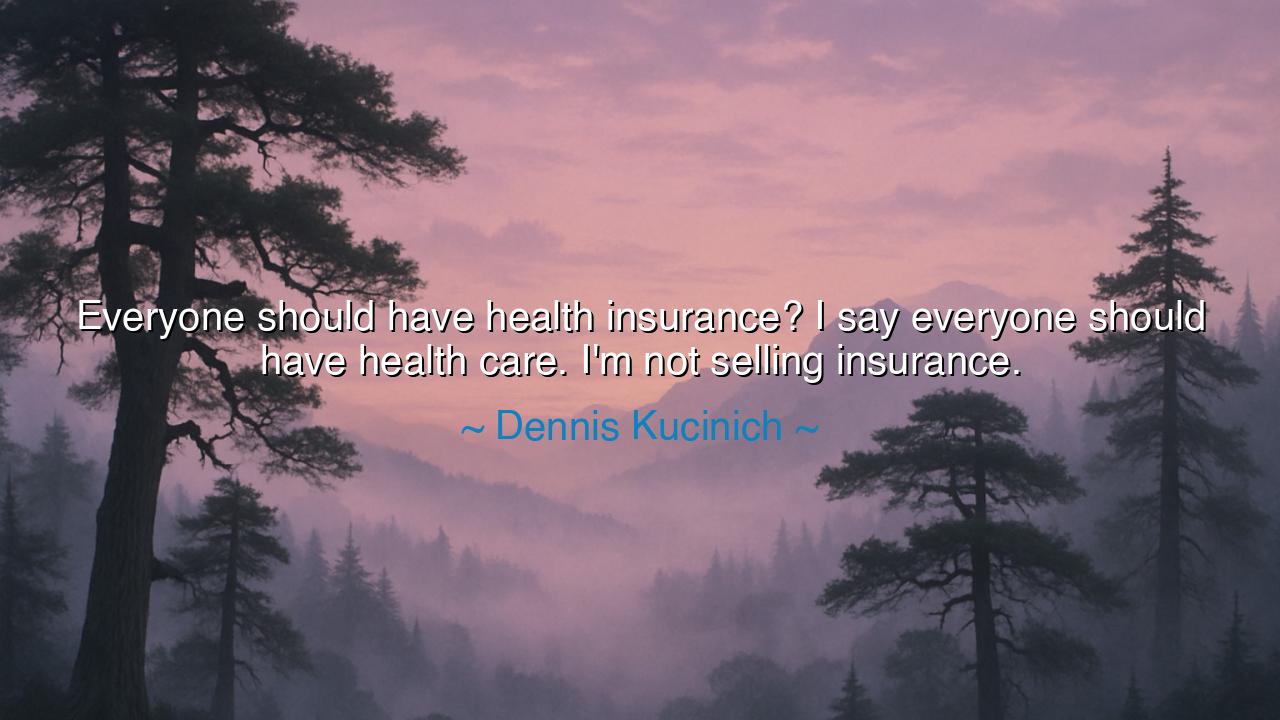
Everyone should have health insurance? I say everyone should have
Everyone should have health insurance? I say everyone should have health care. I'm not selling insurance.






In the words of Dennis Kucinich, the truth-teller and statesman of conscience, we hear a cry that echoes through the ages: “Everyone should have health insurance? I say everyone should have health care. I’m not selling insurance.” These are not the words of a merchant or a politician seeking favor—they are the words of a guardian of justice, reminding humanity that healing is a sacred right, not a commodity. His voice calls us back to an ancient truth long known to the wise: that the care of the sick and the tending of the weak are the highest duties of a civilization.
In the ancient world, before gold ruled the hearts of men, healers were not traders of policies or brokers of profit—they were servants of the divine balance between life and death. The physicians of Egypt, the herbalists of China, the sages of India, and the healers of Greece all shared one understanding: health care was an act of compassion, a covenant between healer and humanity. When Kucinich speaks, he speaks in this old tongue, reminding us that to reduce the sacred art of healing to insurance is to forget what it means to be human.
Consider the story of Florence Nightingale, who entered the dark tents of the Crimean War where men lay dying by the thousands—not from battle wounds, but from neglect. She asked not for payment or policy. She asked only for clean bandages, fresh air, and compassion. Her lamp became the symbol of mercy that lit the night of suffering. Would she have stopped to ask if her patients had coverage before tending their wounds? Never. For she, like Kucinich, knew that health care belongs to all, and that to withhold it is to wound the soul of society itself.
Kucinich’s words pierce deeper than politics. They speak to the division between systems and souls. Insurance is a shield made of paper and promises, often forged in halls of profit. But health care—true health care—is the embrace of humanity, the shared vow that no one shall be left to perish for want of medicine or mercy. His declaration reminds us that the measure of a nation is not in its wealth, but in how it tends its weakest hearts. For the healer’s oath is not to profit, but to life itself.
And yet, in our modern age, we have entangled the sacred in the snares of commerce. We have built temples of healing where entry is determined by coins, and where the suffering must beg for permission to be saved. Kucinich’s voice rises like a prophet’s cry against this corruption, calling us to remember that compassion cannot be bought, and care cannot be sold. To heal should never depend upon what one can afford—it should depend only on what one needs.
In his vision, one hears the echo of ancient law: “Do unto others as you would have them do unto you.” When sickness comes—and it comes to all—it is not wealth that saves us, but the kindness of those who answer our pain. Thus, Kucinich’s teaching is not merely political—it is moral, even spiritual. It commands us to build a society that honors healing as a human birthright, not a privilege bestowed by systems of greed.
The lesson, then, is clear. We must reclaim the sacredness of health care, remembering that behind every patient is a life, a family, a universe of dreams. Support systems that serve the people, not the purse. Advocate for access, for fairness, for dignity in illness. And in your own life, be a healer in whatever way you can—through compassion, through service, through the simple act of caring for another without expectation of gain.
For as the ancients taught, the health of one is the health of all. When one person suffers without care, the spirit of humanity itself weakens. But when we answer suffering with love, we rise together. In the end, Kucinich’s words are a call to remember who we are—not sellers of protection, but keepers of life. And that is the truest form of medicine.






AAdministratorAdministrator
Welcome, honored guests. Please leave a comment, we will respond soon